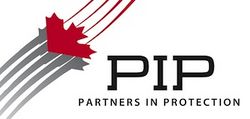PIP (Partners In Protection) Information
| This article is part of the Customs Compliance Guide |
The Partners In Protection (PIP) program is a cooperative program between private industry and the CBSA aimed at enhancing border and trade chain security. This voluntary program has no membership fee. It is designed to streamline and make border processes more efficient for low-risk, pre-approved businesses recognized as trusted traders. As a member, you must abide by the roles and responsibilities outlined in the PIP Terms and Conditions of Use. In return, the CBSA will assess your company's physical, infrastructural, and procedural security, and will recommend necessary improvements. This will enhance the integrity of your production, transportation, importation and/or exportation processes.
History
Partners in Protection (PIP) was developed in 1995 with a primary focus on promoting business awareness and compliance with customs regulations.
In 2001, PIP program's focus shifted to place a greater emphasis on trade chain security, which included urging members to improve their physical, infrastructure and procedural security. A security questionnaire was developed with suggested security recommendations.[1]
The importance of the PIP program increased in 2002 when a PIP membership became a prerequisite to participate in the Free and Secure Trade (FAST) program. FAST provides expedited border clearances into Canada for pre-approved importers, carriers and drivers.
PIP Eligibility
You must meet the following criteria:
- Own or operate facilities based in Canada or the United States that are involved in moving commercial goods across the border;
- Be in existence for a minimum of one calendar year. In the case of importers and carriers, be an importer or transporter of commercial goods to or from Canada at least once, prior to the 90 calendar days before the day on which the application is received;
- Be solvent and have no unresolved debts to the Crown or undischarged bankruptcy;
- Have a good record of compliance with the CBSA and other government departments;
- Have no convictions (for which a record suspension has not been received) under the Criminal Code of Canada or under any other federal or provincial legislation;
- Have no convictions outside of Canada under foreign law that, if enforced in Canada, would constitute an offence under an Act of Parliament or under any other federal or provincial legislation;
- Have no history of significant contraventions under the Customs Act or any of its regulations, or under any act or regulation enforced by the CBSA or other international customs organization;
- Be compliant with all minimum security requirements (MSRs) outlined in the PIP Security Profile unless special consideration is given to the business’ particular operations or security structure at the discretion of the CBSA.
To be eligible the company must conduct operations in at least one of the following lines of business:
- Commercial carriers in the highway, rail, marine, and/or air modes of transport (including couriers*)
- Importers
- Exporters
- Freight forwarders
- Warehouse operators (including marine terminal operators)
- Customs brokers
- Shipping agents[2]
Benefits of PIP Membership
As a member, your company can take advantage of the following benefits:
- You will have access to CBSA security assessments, awareness sessions, and CBSA expertise.
- When you reach the border your company will be recognized as a Trusted Trader, which can save time.
- Your company will have a reduced risk score, which can result in a lower examination rate at the border.
- You can market your company as a secure, low-risk Trusted Trader.
- You will have access to the Trusted Trader Portal, which will allow you to keep your membership documents up to date.
- You will be eligible to apply for the Free and Secure Trade (FAST) benefit, if you are also a participant in the Customs Self Assessment (CSA) program. This will give you access to the designated FAST lanes to cross the border into Canada.
- You will be eligible to participate in the Courier Low Value Shipment (LVS) program. The LVS Program streamlines processing of low-value shipments through customs while providing the courier industry with expedited release.
- Your company will be recognized as a Trusted Trader under the CBSA's mutual recognition arrangements with: U.S. Customs and Border Protection's Customs Trade Partnership Against Terrorism (C-TPAT) program; Japan Customs and *Tariff Bureau's Authorized Economic Operator program; Korea Customs Service's Authorized Economic Operator program; Singapore Customs' Secure Trade Partnership (STP) program; and the Tax Administration Service of the United *Mexican States – New Scheme of Certified Companies (NEEC).
Other Trusted Trader Programs
- FAST
- Free and Secure Trade is a joint initiative between CBP and CBSA designed to enhance border security while speeding up the processing of low risk shipments. Carriers that are FAST approved for the U.S. are able to transport FAST shipments, and are afforded special processing at the border including dedicated lanes and front of line line processing in the case of inspections.
- CSA
- Customs Self Assessment allows for the clearance of goods imported by a CSA Approved importer and transported by a CSA Approved carrier. For a shipment to clear under CSA both the importer and carrier must be CSA Approved, and the driver must be registered with either the Commercial Driver Registration Program (CDRP) or the Free And Secure Trade (FAST) driver registration program.
- C-TPAT
- Customs-Trade Partnership Against Terrorism is a voluntary public-private sector supply chain security program led by U.S. Customs and Border Protection (CBP). Through this program, CBP works with the trade community to strengthen international supply chains and improve United States border security.

